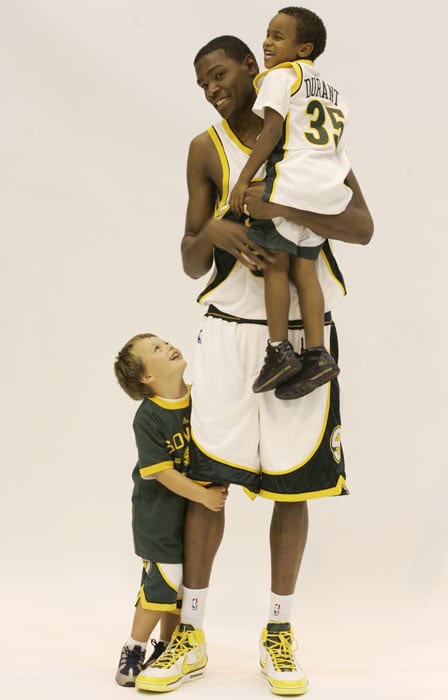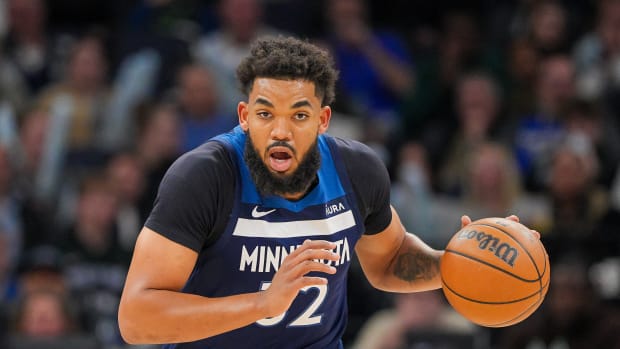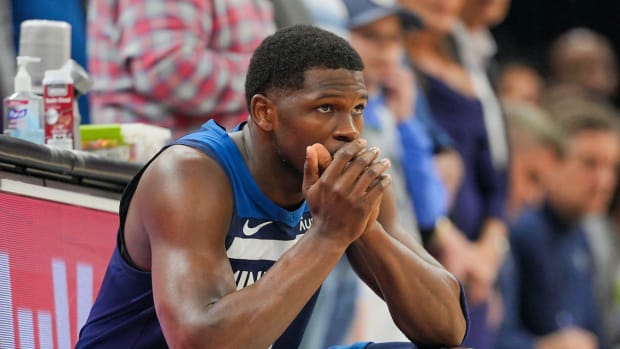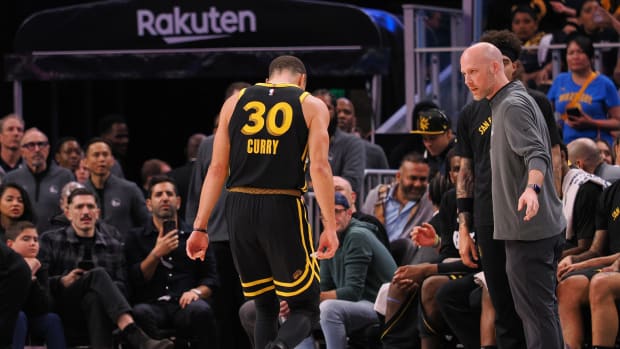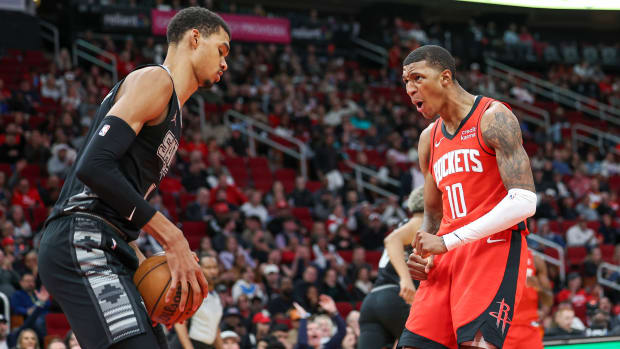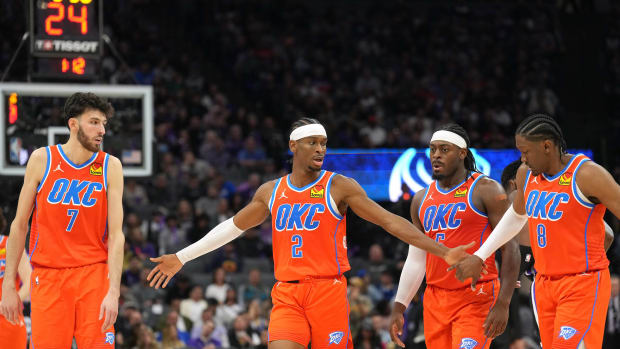Thunder Road: How long before Kevin Durant and Oklahoma City reign?
Get all of Lee Jenkins's columns as soon as they’re published. Download the new Sports Illustrated app (iOS or Android) and personalize your experience by following your favorite teams and SI writers. This story appears in the May 30, 2016, issue of Sports Illustrated.
Through the living room window of his spacious brownstone in downtown Oklahoma City, Kevin Durant can see the Devon Energy Center, stretching 50 stories into the red sky. Whether Durant is padding around his house or pulling out of his garage, the soaring glass tower unfailingly catches his eye, transporting him to the summer day in 2008 when he arrived in his new home and surveyed the flat landscape. “I think of myself as a small-town kid,” Durant says. “I liked the small-town vibe. But it was a ghost town. The downtown wasn’t really a downtown. I don’t remember a single tall building. Now I look at that building and it’s a beacon, reminding me what we came from.”
Thirty-three people worked for the Thunder in a converted roller rink perfumed by the dog-food factory nearby. Durant, then 20, and his college-age teammates practiced three hours a day in the stench, and for fresh air they hopped into the beds of pickup trucks and rode to a brick subdivision with a drainage basin in the middle. They sprinted up the sides until they were tired and hungry, then retreated to Durant’s house in Edmond and collapsed on his stuffed couches, playing video games and eating chicken wings.
“We don’t have anything,” Oklahoma City general manager Sam Presti thought, uncertainty breeding excitement. “We don’t have anything.” The erstwhile Seattle Supersonics started 3–29, and when they edged a mediocre Knicks squad at home in January, the crowd roared as if the Sooners had toppled the Longhorns. “What’s up with that?” Presti asked an usher. “We beat New York City!” the usher howled. “The Big Apple!”
The Thunder reached the playoffs in their second season, the Western Conference finals in their third, the Finals in their fourth. Loud City was born. “We were on our way,” Durant says. Then they traded James Harden to Houston in October 2012, watched Russell Westbrook limp out of one playoffs and Serge Ibaka another. “Damn, what happened?” Durant asked himself, his own foot injuries eliminating Oklahoma City from contention last year. “We were right there, and everything we built is crumbling.”
Open Floor: Draymond Green decision, Warriors-Thunder clash and more
A new collective bargaining agreement handcuffed the Thunder when they were trying to retain their core, and a rising salary cap opened space for free-agent pillagers. A disgruntled regular, Reggie Jackson, was exiled. A beloved coach, Scott Brooks, was fired. Every NBA plague, including what Pat Riley termed the Disease of More, threatened to infect OKC. “This profession is so fragile,” Durant says. “But we didn’t make excuses. We fought.”
The organization nearly doubled in size, Presti tabbing whiz kids who would eventually run their own front offices, plus a sports scientist and a wellness expert who were the first of their kind to join pro teams. A shiny practice facility opened, catered by local farmers who bragged that their organic zucchini boosted Westbrook’s vertical leap. KD and Russ, rocking leather backpacks and then lensless frames, showed brand managers from L.A. to New York that talent sparkles anywhere. A global celebrity can rise from the bottom of the Dust Bowl.
The Thunder are back in the Western Conference finals—leading Golden State 2–1 at week’s end, after a 28-point shellacking in Sunday’s Game 3—for the fourth time in six years, and during that period they’ve compiled the best record in pro sports (.665) outside of the Patriots, Spurs and Packers. This series would appear to be a watershed, considering that Oklahoma City has never won a championship and that Durant will be a free agent on July 1. If it wins he will have a hard time walking away, but if it loses it sounds as if he may also have a hard time walking away.
“Our world revolves around championships,” Durant says. “Who won the championship? Who will win the championship? If you’re not the champion, you’re a loser. If you’re not first, you’re last. Don’t get me wrong, I want to win a championship more than anybody, but if you go through the journey we’ve gone through, you can also appreciate other things.” Like the skyscraper, completed nearly four years ago, towering outside his window.
• MORE NBA: Durant channeling his inner Draymond against Warriors
“But it’s not just that,” Durant continues. “I drive through downtown, through midtown, through the Asian district and see so many different businesses, so many different people. It’s a big, diverse city that’s grown with the team.” The impact of sports franchises on urban renewal is often overstated, but in Oklahoma City it’s obvious. “The Thunder has given us a worldwide brand we’ve never had before,” says the mayor, Mick Cornett, citing the area’s strong corporate recruitment and staggering influx of millennials. “The exposure has been immeasurable. You tell somebody in another country you’re from Oklahoma City, and they say, ‘Kevin Durant.’”
Wherever Durant ranks in the world’s best player polls—top three, to be sure—no one makes a larger local imprint. He now lives in Deep Deuce, just north of Bricktown, and posts up with a beer by the fire pit at Deep Deuce Grill. “You know how in your neighborhood there’s a spot where everybody goes,” Durant says. “That’s our spot. I walk there, and when I open the door, everybody is like, ‘Hey, KD. What up, KD?’ Then they go back to their beer.
“Where I grew up, we were 30 minutes outside of Washington, D.C., but there was never anything new. In Oklahoma City everything is new. We’ve got a new Aloft Hotel up the street. There’s a new arcade, Brickopolis, I want to try. Behind my house all these new town homes are going in, and along the highway out to our facility, they tore down the old car wash and are putting up more new condos.
“I know that’s not a championship. But the championships, the records, the who’s the best player—there will always be new champions and new records and new players. What we’re talking about, these are jobs, these are lives, these are things that will matter for 40 years, and that is very cool to me.”
Every sentence is read and read into. Such is life for a 27-year-old forward who can transform a franchise simply by signing his name. Projecting what Durant might do, even a month out, remains pointless. People leave places they love all the time. The pressure to win, placed on a headliner’s shimmying shoulders, is impossible to fathom. The Thunder won plenty this season, 55 games, but they weren’t the Spurs at 67 or the Warriors at 73.
“You look at San Antonio not losing, Golden State not losing, and you think, We should be like that, too,” Durant says. “I was going home stressing out about two losses in a row. I was even stressing out about wins. We beat New York in overtime and I was like, We made this harder than we had to! We played a lot of games like that. Of course it drives you crazy. When you want something so bad, and you train so hard, if it doesn’t drive you crazy, then I don’t think you’re really in it.”
• MORE NBA: Does 73 wins matter if the Warriors don't win the title?
They had a new coach, Billy Donovan, who experimented with lineups, minute allotments, pick-and-roll coverages. He went small, with Durant at power forward and Ibaka at center, and then big, with 6' 11" Enes Kanter alongside 7-foot Steven Adams. He played Durant and Westbrook together the entire first quarter, allowing the bench more freedom in the second, but that backfired so he staggered his stars’ court time. He stopped blitzing every ballhandler, a Thunder trademark, to better protect the three-point line. He emphasized weakside action, an OKC sore spot, to grease movement.
“I needed to take risks,” Donovan says. “I needed to get answers. Sometimes you have to throw stuff out there and see whether it’s a good idea or isn’t. I told the guys there would be some rocky roads.” They started 7–6. They lost eight of 12 after the All-Star break. At Florida, Donovan would have said he was playing for March. In Oklahoma City it was for May. Durant required some late-night reassurances, via text, from Presti and assistant GM Troy Weaver: Stay with this, they urged. Execs compared Donovan with a masseur, working out long-lasting knots, a process both painful and productive.
• MORE NBA: NBA appeals to greater good, spares Draymond Green
Donovan’s thirst for discovery tested the Thunder, but it was the reason they hired him in the first place. Presti is a seeker who draws inspiration from artists, architects, academics and musicians. When he scouts a college player, he often contacts a professor on campus and asks for office hours, to inquire about the prof’s work. Presti particularly enjoyed his trips to the University of Florida, where Donovan held his coaching clinic every August, a high-minded roundball seminar. Presti lit up when a Weber State assistant named Phil Beckner conducted a session about footwork drills with Damian Lillard.
Donovan had rejected prior NBA overtures, most memorably in 2007, when he backed out of a deal with the Magic. The Thunder were different, and not just because of Durant and Westbrook. “It reminded me of where I’d been,” Donovan says. He too built something where there was nothing, a basketball power at a football school. When Presti interviewed Donovan, they talked more about values than strategies, and the GM kept returning to familiar catchphrases: Legacy. Community. Stability. Donovan, who was flanked by the same athletic director, associate AD, academic adviser and secretary for all of his 19 years at Florida, found a next-level fit.
The Thunder are famous for their fastidiousness—the logo on every basketball, like the label on every organic juice bottle, faces outward at all times—but this is also the organization that holds cooking classes for players and their significant others, hosts weather symposiums for acquisitions spooked by Midwestern storms and sends Santa Claus to staffers’ homes when the team is away for Christmas. At the preseason picnic, thrown on a farm every September, bounce houses and face-painting stations abut fish-stocked ponds. Durant and Westbrook play football, covering each other’s deep routes. A photographer snaps pictures for the archives.
“They’ve separated themselves in certain ways from the rest of the league,” says center Nazr Mohammed, back for his second tour in OKC. “The college atmosphere they used to have is different because the guys are older, but it’s still there. It’s ingrained. It’s the vision Sam had.” Because Presti is 39 and wears glasses, it is easy to portray him as another Moneyball caricature, but words like holistic and humanistic roll off his tongue far more than advanced stats. He hired Amanda Green as basketball operations coordinator, the rare African-American female in an executive role; Darko Rajakovic, the first international coach to helm a Development League team; video analyst Sebastian Pruiti, a former blogger. Presti sits in the waiting room during every player’s surgery, so he is there when the anesthetic wears off.
• MORE NBA: Giant Killer: Draymond Green dares you to define him
Mohammed, who aspires to be a GM, asked to shadow Presti for a day this winter. Mohammed is fascinated by the rationale behind the layout of the Thunder facility: how players are served breakfast almost at the entrance, then reminded of their community appearances, then greeted by the training staff and the strength coaches, all before touching the floor. Presti accommodated Mohammed, on one condition. He had to work out with Dakari Johnson, a fellow Kentucky product who plays for the Oklahoma City Blue, the Thunder’s D-League affiliate. Mohammed happily drove to the Blue’s headquarters, at the old roller rink.
Presti used to surround his young stars with veteran voices. Now the Founding Fathers—his pet name for Durant, Westbrook, Ibaka and forward Nick Collison—advise apprentices of their own. Durant tutors fourth-year shooting guard Dion Waiters while Westbrook takes rookie point guard Cameron Payne. Last summer Collison invited Adams to his house on Lake Washington in Seattle, and they rode his ski boat to daily workouts at UW. On the ride back they cracked open coolers of Pacifico and jumped in the water.
“There’s a shared history here, and that’s what’s rare,” Collison says. “When someone leaves, he’s starting over with new guys and building a new history, and that could be really good. But the ownership you feel, when you were here from the beginning, you might not feel again.”
The morning of Game 1, Durant gathered the Thunder after shootaround at Equinox Sports Club in San Francisco. “I’ve become more comfortable talking in front of my teammates,” he explained later. “I was sure they were all getting texts from family and friends, hyping this series so much. I told them, ‘Relax. If the Warriors make a run, if some things go wrong, don’t worry about it. Don’t tense up. Keep playing.’ That’s kind of been the story of our season.”
While Durant recovered from his third foot operation last spring, wearing an orthopedic boot and riding a motorized scooter, he watched Westbrook embark on a historic offensive jag. Forever the wingman, Westbrook was an MVP candidate, and Durant wondered what it would mean when he returned. “I had to think the game differently,” Durant says. “How can I still be me without taking away from him? That was my challenge. I was used to having the ball in my hands all the time and scoring 35 points. Now we have all these other people—Russ, Enes, Dion, Serge—and we’re a better team. So when I get shots, I have to be super-efficient. I can’t expend energy trying to dunk on people. I have to take every shot like it’s my last one, like it’s a game-winner.”
Durant agreed to stagger his minutes, sitting late in the first quarter, which he was once reluctant to do. He cut his technical fouls in half, from 16 to eight, since his last full season. He averaged 28.2 points, 8.2 rebounds and 5.0 assists on 50.5% shooting, incinerating any long-term concerns about his foot. “I was scared, I was worried,” Durant says. “Will I be back again? Will I be who I am? A year ago people were telling me my career might be over and I listened to that stuff, not because I’m sensitive but because I used it for fuel. I’ve always done that. When I was a sophomore in high school, I scored 28 points in my first varsity game, and I was feeling myself. They’re loving me right now! Then I got in the car afterward and my mom [Wanda] was like, ‘You didn’t do s---. You didn’t play well enough.’ I was like, O.K., cool. It was the same thing with the foot. The doubt feeds me.”
Durant trusted Donovan’s tinkering and saw the results. Oklahoma City put up the NBA’s second-best offensive rating in the past five years, trailing only these Warriors. “I hear about other coaches who are absolute wankers and don’t want to listen to new ideas,” says Adams, a candid New Zealander. “He tries everything.” While much of the NBA attempts in vain to mimic the mighty-mite Dubs, the Thunder have embraced their own distinctive quality, the unusual blend of length and athleticism embodied by Durant, Ibaka, Kanter and Adams. “We can play small, too,” says Mohammed, “with 7-footers.”
GALLERY: Rare photos of Kevin Durant over the years
Rare Photos of Kevin Durant
Kevin Durant
Chase Budinger and Kevin Durant
Texas Longhorns
Kevin Durant and Candace Parker
Al Horford, Corey Brewer, Kevin Durant, Michael Conley, Jr., Greg Oden and Joakim Noah
Kevin Durant and fans
Kevin Durant
Kevin Durant and Family
Kevin Durant
Kevin Durant
Kevin Durant
Team USA
Kevin Durant, Jeff Green and Yi Jianlian
Kevin Durant's Trophy Case
Kevin Durant and Jeff Green
Kevin Durant and Lebron James
Kevin Durant and Presidential Guard
Kevin Durant's Sneaker
Team USA
Kevin Durant
Kevin Durant
Kevin Durant and Wanda Pratt
Kevin Durant and Lil' Wayne
Kevin Durant
In Game 3 of the conference semifinals against San Antonio, Donovan paired Adams and Kanter, to no avail. “The numbers were bad,” Donovan says, but as usual, he wanted to know more. “I saw that the numbers were bad because the spacing was bad. Enes and Steven had to work together—one high, one low—and communicate. They figured it out.” The jumbo lineup stifled the Spurs while Durant overwhelmed Kawhi Leonard, the NBA’s forward du jour. Donovan took the opposite approach in Game 3 of the Western finals, downsizing with a front line of Durant and Ibaka, who dusted Golden State’s most agile groupings and inflamed Draymond Green into a groin kick on Adams. The Thunder vanquished the 67-win Spurs, and if they add the pelt of the 73-win Warriors, they will complete arguably the greatest Finals run ever.
Keep in mind, this is Donovan’s first playoffs, and he remains without top assistant Monty Williams, whose wife died in a car accident in February. Replacing Williams is the Blue’s Mark Daigneault, a midseason coaching call-up, and another exemplar of OKC’s sustainable culture.
Sometimes you have to play a long time to be able to play like yourself. Presti is reminded of that quote as he stands on the second floor of the San Francisco Art Exchange, staring at a color photograph of the man who said it. Presti is a Miles Davis fan, not only because of the jazz he played, but also the talent he nurtured: John Coltrane, Herbie Hancock, Tony Williams. In the photo Davis stands offstage at the Newport Jazz Festival, holding his trumpet. He is watching rather than playing. Presti makes out the whites of his eyes, hidden behind huge sunglasses. He wonders whom Davis is looking at. Maybe it’s Coltrane, maybe it’s Hancock. He buys the piece.
The Thunder have blossomed from startup to blue chip. They don’t work out for three hours a day anymore; wearable technology tells them they can accomplish as much in half the time. They don’t run in a subdivision; the team built a hill outside its facility. They don’t play video games all night; Westbrook married his college sweetheart, Nina Earl, over the summer. They have been hardened by trades, injuries, disappointments and a hundred goofy story lines. “Every talk show,” Collison laughs, “about Russell and his attitude.”
As much as Durant and Westbrook, have accomplished in the past eight years, it is easy to forget that they are 27 and just now reaching their primes. This is supposed to be the good part, with the two superstars at the peak of their powers, Adams and Kanter graduating from the development stage, and a few others close behind. Thanks to the rising salary cap every team will chase Durant this summer, including the Warriors and Spurs. But the incumbent is displaying some unmistakable advantages: An inquisitive coach. An avant-garde GM. A breathtaking costar. And a burgeoning city, all spread around his fire pit.







































